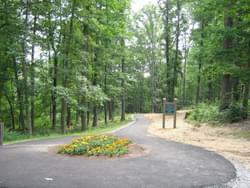




The Universal Trail Assessment Process (UTAP) helps Cornelia, Georgia receive recreational trails funding for trail improvements.
The Universal Trail Assessment Process helps Cornelia, Georgia receive recreational trails funding for trail improvements.

Mona Painter, with the City of Cornelia, Georgia submitted successful grant applications for Georgia Recreational Trails Program funding in 2008 and 2009. This program awards funding based on a points system. Forty points are added for projects that conduct a systematic study of existing trail facilities to assess their environmental impact and maintenance needs, and make environmental improvements to existing trail facilities.
Additional consideration is given to projects that assess existing trails to determine the level of accessibility for people who have disabilities, to develop programs to provide trail access information, and for their environmental impact and current or future maintenance needs. These assessments must be performed according to a standardized method of measuring and reporting objective conditions, and UTAP meets this criteria.
The Universal Trail Assessment Process (UTAP) was used to assess Cornelia Park Trail, a primitive trail that had been built as an Eagle Scout project in the 1980’s. The assessment identified current and potential sources of environmental impact, maintenance needs, and improvements needed to prevent erosion and ensure sustainability. A major project component of the project was for the trail to be accessible to those with disabilities. UTAP was used to measure existing grades, slopes, surfaces and other trail characteristics, making it easier to design a plan to meet project goals.
Thanks to Georgia Recreational Trails program funding and help from sponsors, Cornelia City Park now has a trail designed for both accessibility and sustainability.
The trailhead, which was part of the 2008 project, includes accessible restrooms, a drinking fountain, an information center, and parking for bikes and vehicles.
The trail was paved and portions were rerouted. Land disturbance was kept to a minimum by use of switchbacks to achieve desired grade rather than disturbing native trees and vegetation with heavy grading work. Boardwalks were added in the steepest parts of the trail to allow easier access and to alleviate erosion problems associated with trails situated in hilly terrain.
Soil erosion, sedimentation control measures and Best Management Practices were included in construction plans to minimize environmental impacts. Site furnishings (benches, information center) are made of recycled material. Trees were worked around rather than removed.
Cornelia used the UTAP to assess the original trail, and then repeated the assessment on the rehabilitated trail. Comparisons were made between the old and improved trail by looking at the automatic trail summaries produced from the inventory process that shows trail distances, typical grade and cross slope, tread width, obstructions and surface type.
UTAP has the potential to provide an excellent marketability of trails throughout Georgia and enables hikers to make informed decisions about which trails suit their interest and physical abilities. Mona states, “A novice hiker that started with a trail that proved too difficult may not attempt hiking again, but if he/she can access information on-line prior to setting out they are more likely to have a good experience.”
To learn more about UTAP, visit Beneficial Designs. Beneficial Designs developed the UTAP and has coordinated with American Trails to train over 1,000 individuals to lead trail assessments across the United States and Canada.
To learn more about this Cornelia, GA trail project, you can contact Mona Painter at 706 499 1241 or [email protected].